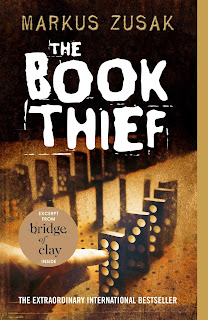[Novel] The Power of Words in "The Book Thief"
In The Book Thief by
Markus Zusak, the power of words is felt throughout the novel. Narrated by Death, The Book Thief is the story of Liesel Meminger, a nine-year-old
German girl who is given up by her mother to live with Hans and Rosa Hubermann
in the small town of Molching in 1939, shortly before World War II.
Liesel attends the local school where she is bullied because she cannot
read. Hans teaches her to read at night, Liesel quickly understands the power
of the written word and falls in love with books.
The novel is set in Germany during World War II, under Hitler’s
regime. Because Liesel Meminger is
living in the middle of Hitler’s influence. His words are controlling large
groups of people. Germany is at war with people who do not fit the prescribed
model of a person. Jewish people are being rounded up and taken to be executed
and a young Jewish man comes to live with the Hubermann, Max. During this war
that began from words, Liesel learns the power of words in a different way. She
learns that words and reading create community and family, and they also have
the power to save lives.
Liesel is an orphan. She comes to live with Hans and Rossa Hubermanns
and must call them Papa and Mama. She doesn’t bond with them at first. She lost
her brother to death and her real mother takes off. But at the site of her
brother’s burial she finds a book and hides it under her bed. She has regular
nightmares and it is Hans Hubermann, Papa, who comforts her and it is Papa who
finds the book. He teaches her to read and it is a nightly custom to read
together after her nightmare. He even sells his precious cigarettes to get her
books for Christmas. They became a family because of books and words.
Liesel makes friends with the mayor’s wife, who is from a different
social class than the Hubermanns. Ilsa Hermann witnessed Liesel’s second theft.
Instead of confronting the thief she invited Liesel into her home. Liesel’s
reaction was panic, “She is going to take me inside, light the fireplace, and
throw me in, books and all”(Zusak 133). Instead she returned many times to read
in the afternoon, to memorize words to learn later, and to sit with a lonely
woman who had embraced her sorrow. Even after Liesel could no longer go to the
house legitimately, Ilsa leaves a dictionary for her and it is Ilsa who takes
her in after the bombing. That is an evident of a connection made from words
and reading.
Liesel even saves Max using words. When Max is sick, Liesel reads to
him and describes her activities to him. She reads entire books to him and even
steals another book, just to read it to Max. And it works. He wakes up. Mama
even comes to the school to tell her, “you told me to yell at you. You said
they’d all believe it…He woke up, Liesel, he’s awake.”From her pocket, she
pulled out the toy solider with the scratched exterior. “He said to give you
this. It was his favorite” (Zusak 332). She saved a man and brought her mother
to school to hug her.
Liesel creates a community in the bomb shelter. She reads during the
bombings and everyone feels some comfort because of it, even Frau Holtzapfel
and Pfiffikus thanked her for the distraction. It is because of her reading in
the shelter that Frau Holtzapfel stops her grudge with the Hubermanns and asks
Liesel to read to her in the evenings. They bargain and trade for her to do the
job then it stops the animosity between Frau Holtzapel and Rosa Hubermanns.
Adolf Hitler, a man without the qualifications, manipulates his way
into being the leader of Germany; “Yes, the Fuhrer decided that he would rule
the world with words. ‘I will never fire a gun,’ he devised. ‘I will not have
to’” (Zusak 445). Words were what enabled Adolf Hitler to gain power – his book
Mein Kampf (My Struggle). Based on The Holocaust essay Mein Kampf is a book
written by Adolf Hitler while he was in prison during 1923-24. In it, he
portrays himself, at age 35, as a great intellectual and political figure. His
single purpose was to write about his personal greatnesses, and about his plans
to take over Germany so he can get rid of the Jews. He takes much credit in Mein
Kampf, he doesn’t mention the fact that his parents, Lanz, and others
influenced him a lot. He describes all of his ideas about the “Final Solution”
to get rid of all the Jews in Germany, and then on to all the Jews in the
World. He also talks about the perfect race of Aryans, blond, blue eyed, broad
shouldered Germans, and about promoting the spread of anti-Semites all over the
world.
The only reason that Adolf Hitler comes to power in Nazi Germany is
the genius and power of his words. He never utilizes the brute force of a gun;
he simply wields the ability of his words to get what he wants. Hitler’s use of
the manipulative power of words is arguably the best in history, rising to
power and getting 90% of a country to hate, and want the death of an entire
race, from the simple use of speech clearly indicates the immense deceitful
power of words.
In celebration of the Fuhrer’s birthday, a large bonfire is held in
the middle of Molching to burn Jewish books. The purpose of the bonfire is to
destroy the stories and words that oppose the teachings of Adolf Hitler, because
he realizes that the power opposing opinions may manipulate the public into
thinking differently to what he has told them. Powerful words used for positive
actions can have the same massive influence as deceitful ones.
In Max Vandenburg’s novel, The Word Shaker, a young girl (portrayed
as Liesel), grows a tree from her words. Her opinions were too strong to be
destroyed by the Nazis; “Many hours passed, and still the Fuhrer’s ax could not
take a single bite out of the trunk.” (Zusak 447). Max Vandenburg portrays
Liesel’s words as a tree, sprouting from a tear of goodness. Her words’ power strengthens
greatly, their manipulation and influence are so strong that Hitler cannot
destroy them. Liesel’s words are a good sort of manipulation; they are so
powerful that they have the ability to stop even the greatest word shaker. In The Book Thief, words used powerfully
for goodness and manipulation have massive influence, yet one’s vocabulary can
get more powerful still. Some words even have the ultimate power, the power to
choose between life and death. Although it may seem less direct than a judge
awarding a convict the death penalty or letting them off, words in Nazi Germany
are the main reason why some people die, and some live. To start, people can be
saved indirectly by words, being occupied by these beautiful works of
literature can save people from the outside world quite literally. During a
bomb raid over Munich, when the sirens are a slight bit late, Himmel Street is
devastated. Everyone is killed, well – everyone but a little girl. Liesel
Memmiger is writing her book in the basement of her house when the bombs strike
Heaven Street; “I wonder what she was reading when the first bomb dropped from
the rib cage of a plane” (Zusak 528). The fact that Liesel is writing in her
basement is the only reason that she survives, her love for words give her the
motive to write very early in the morning, in a cold, dark, German basement. It
is in-direct, but the power of words is the reason that The Book Thief’s life
is saved.
Words that Hans says to Max and his mother, although not meaning to,
give Max the sanctuary in which he was able to live; “’He saved my life’…’He-if
there’s anything you ever need’” (Zusak 179). During World War 1, Max’s father
Eric saves Hans’s life by electing him to not go into battle, on the particular
day that the entire battalion is killed. Riddled with survivor’s guilt, Hans
offers Max anything that he ever needs, not knowing how much influence those
words would have on to come. The simple, guilt laced words that Hans says, not
meaning to be extremely influential, are powerful enough to save Max’s life
from the Fuhrer.
The power of words as metaphors for creation is extremely important in
the destruction, violence and death of Nazi Germany. The Nazi book burnings
were intended to control the German people even more by restricting what they
were allowed to read and write. Control of the mind could be seen as even more
crushing than physical sanctions. When Liesel manages to save one book from the
pyre of smoldering paper, she resists the power of Nazi regime and even this
one small gesture is enough to prove that they do not completely control her
life.
Max also uses the power of words, writing in this case, to rebel
against the anti-Semetic Nazi Party and Hitler himself. He directly challenges
the core ideals of Nazi rule when he transforms his copy of Mein Kampf into the
story of his life called The Standover Man. Although Liesel and Max both
initially seem powerless to resist Nazi rule, indeed they cannot physically
escape from it, they both reclaim power and independence through books.




Comments
Post a Comment